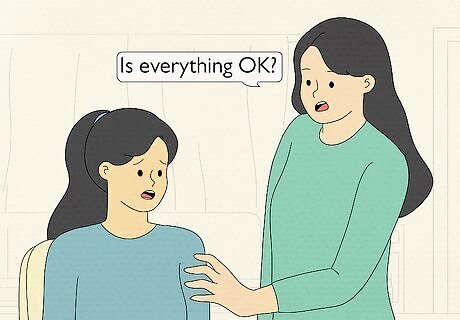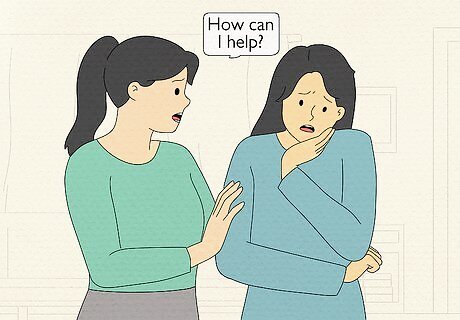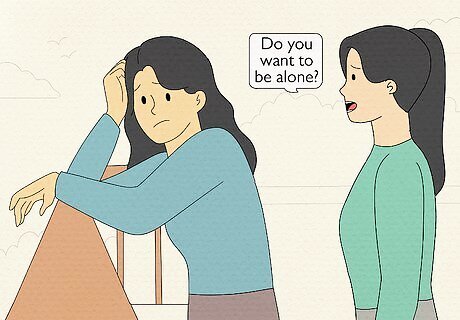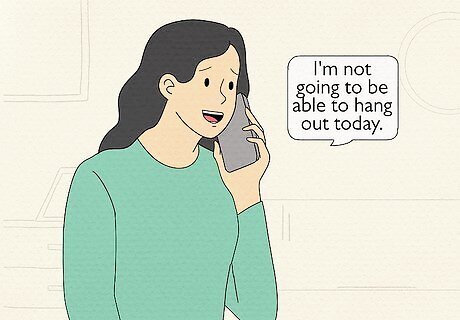
views
Being Supportive

Stay calm. When someone is moody, it doesn't help them if their friends are also tense or upset. It is unlikely that your friend's moodiness is the result of something you did, so don't take it personally. If you feel yourself getting upset or tense, use some calming techniques before talking to your friend. Taking slow, deep breaths is a well-known way to reach a calm place. You can also try counting backwards or actively counting your breaths. This will distract you from a stressful situation and help you center yourself.

Ask what is wrong. If your friend is normally even-tempered, their moodiness might be caused by something that is happening in their life. Maybe they are sick or tired. Maybe they've failed a test. Sometimes just knowing someone cares is enough to bring them out of their funk. Make sure your tone says you are asking because you care. You can try stating what you see, then asking if everything is alright — "You don't seem to be yourself today. Is everything OK?" or "Your reaction seemed a little over-the-top. You OK?" Your friend might not be able to articulate what is causing them to feel sad one minute and happy the next. But just trying to put it into words will often take the emotion out of the situation and help your friend get back on an even keel.

Ask what you can do to help. Your friend might just want a hug to feel better and you won't know if you don't ask. Or maybe they just want someone to sit and listen without judgment. Asking if you can help will also make your friend realize that their moodiness is being noticed, and sometimes that is all it takes for a person to change their mood.

Change the setting. If you friend is feeling sad, a change of scenery can help. Try taking them out for lunch or plan a fun activity with other friends. If you friend is laughing inappropriately or feeling manic, suggest that the two of you go someplace quieter.

Ask if your friend wants you to stay or leave. Sometimes moody people just want to be left alone until they feel better. Other times they want to talk. Ask your friend and let them guide you. If your friend asks you to leave, be sure to check on them later. You don't want them to feel abandoned.
Setting Boundaries

Take care of yourself. Sometimes, your friend's emotions can overwhelm you. If you feel yourself being drawn into their drama, give yourself permission to ignore their texts and calls, or to join another group at lunch. Engage your friend on your terms to keep your life in control. Some moody people use their moods to control their friends and gain attention. If you feel you are always tip toeing around a friend, and always the one who is making compromises to avoid a scene, your friend might be manipulating you. Be kind, but don't feel you always need to do things their way just to make them happy or avoid drama.

Be matter-of-fact about what you want to do. When stating what you'd like to do, don't sound timid or, on the other hand, aggressive. Simply say something like — "I'd rather go to the movies than the mall. Want to come along?" or "I'm not going to be able to hang out today. See you tomorrow."

Take a break. Don't feel you need to be with your moody friend 24/7. No one has that much energy to give. Go have fun with someone else. Go for a walk. Getting away for a while will boost your energy and make it easier for you to help your friend.

Ignore their moods. You can't change how another person feels, but you can change how you react to them. Treat your moody friends the same way you treat your non-moody friends.

Put some distance between you. If nothing you do seems to help, and your friend's moods are interfering with your ability to enjoy life, it might be time to step back from the friendship. It might seem drastic, but sometimes the best thing you can do for someone is let them experience the natural consequences of their behavior.
Seeking Professional Help

Get help for excessive mood swings. If your friend is having intense mood swings, you should look for professional help. School counselors are a good place to start. Your friend's parents or partner should also be notified if the mood swings seem too far out of normal. Some signs that your friend needs more help than you can give include uncontrollable sadness, anger and crying. Uncontrollable laughter and manic highs are also signs that your friend's mood swings are more serious than normal. Your friend might need professional help if their moods swings are caused by drug or alcohol abuse. Eating disorders can also cause mood swings. Friends exhibiting this behavior need more support than you can give. Don't hesitate to seek outside help.

Help your friend find professional resources. If your friend's moods are interfering with their life or ability to keep friends, counseling can help. Your friend might not be able to focus enough to find help themselves. You can do the legwork and research to find appropriate resources. Corporate HR offices and school counseling centers can help guide you. There are several help lines listed online that will provide trained personnel to talk with your friend and suggest local resources. You can also look for free or low-cost services through the mental health division at your local hospital or medical center.

Get help immediately if your friend mentions suicide. Most people hesitate to do anything when their friend talks about wanting to die because they don't want to over-react. But if your friend talks about suicide, you need to get help right away. Don't assume they are just kidding or looking for attention. Encourage your friend to call or text a suicide hotline. They can reach an adviser by calling the Suicide and Crisis Lifeline at 988. If your friend won't call, you can call to get guidance on what to do.




















Comments
0 comment